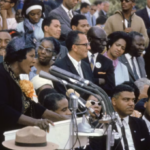Med School’s Dean for Diversity and Community Partnership Address Diggs LectureBy Carla Garnett, NIH Record
|
|
August 25, 2006 – Only by creative collaboration can the medical research community increase the number of underrepresented minorities in its ranks, said keynote speaker Dr. Joan Reede of Harvard Medical School at the 11th annual John W. Diggs Lecture and Scientific Poster Session held on July 28. The poster session was added this year to highlight contributions made to research by underrepresented minority scientists. How do we create an inclusive and diverse environment? Reede said many organizations are asking the same question. Her institution, where she is dean for diversity and community partnership, and director of the minority faculty development program, has responded by “creating and sustaining bridges” through partnerships, consistency, communication and commitment. “Careers are not linear,” she said, explaining that most job paths—particularly those of scientists—do not progress from one point to another without a few side trips along the way. “Everybody’s struggling with diversity. Institutions alone cannot solve this problem. We have to acknowledge that we are all in this together.” Reede briefly outlined the main concern, which is well known to recruiters of potential career scientists: supply and demand—not enough people in the pipeline. It’s a problem that needs further study, Reede said, from several new angles. In the meantime, however, Harvard has had success in growing its scientific workforce diversity by instituting a number of bold approaches, including the Biomedical Science Careers Program (BSCP). One of 16 programs Reede has helped develop at Harvard to address pipeline issues, BSCP identifies and provides mentoring for underrepresented minority students, trainees and professionals who are pursuing biomedical careers. The program was founded in collaboration with the Massachusetts Medical Society and the New England Board of Higher Education. Reede emphasized, however, that Harvard did not rely on any one way to tackle the problem. “It’s not just because of programs in my office,” she noted. “It’s because of a commitment by many institutions.” She said health—and health research—communities have to consider several issues: the role of diversity in health outcomes, and in education and training, and how and when students decide to enter and remain in a science career trajectory. NIH deputy director for intramural research Dr. Michael Gottesman, who earlier in the program received the first Leadership in Scientific Diversity Award from the NIH Black Scientists Association, shared several lessons he said he’s learned over the years about recruitment and retention of scientists: First, “there can be no interest in science unless people have the opportunity to work in a lab or clinic” setting, he said. Next, “it’s not sufficient just to bring people here. They have to be mentored.” And finally, “NIH has significantly revamped our search process” to broaden the way it looks for potential researchers, he concluded. “NIH is committed to diversity in our science and medical programs, and we’re committed to doing a better job” of recruiting and retaining the best scientists. Also recognized during the lecture was senior investigator Dr. Roland Owens, chief of the molecular biology section in NIDDK’s Laboratory of Molecular and Cellular Biology, who received the Philip J. Browning Scientific Pioneer Award. Diggs, former NIH deputy director for extramural research, died at age 59 in 1995. He was widely known as a mentor to scientists young and old and an active promoter of numerous research careers at NIH and beyond. Dr. Vivian Pinn, NIH associate director for research on women’s health, spoke warmly of Diggs’ friendship, painting a vivid picture of him at the lecture named in his honor. “Those of us who knew him miss him tremendously,” she said. “May his flame of decency never be extinguished.”
This article originally appeared in the NIH Record — a biweekly newsletter published by the National Institutes of Health/ Department of Health and Human Services. |










